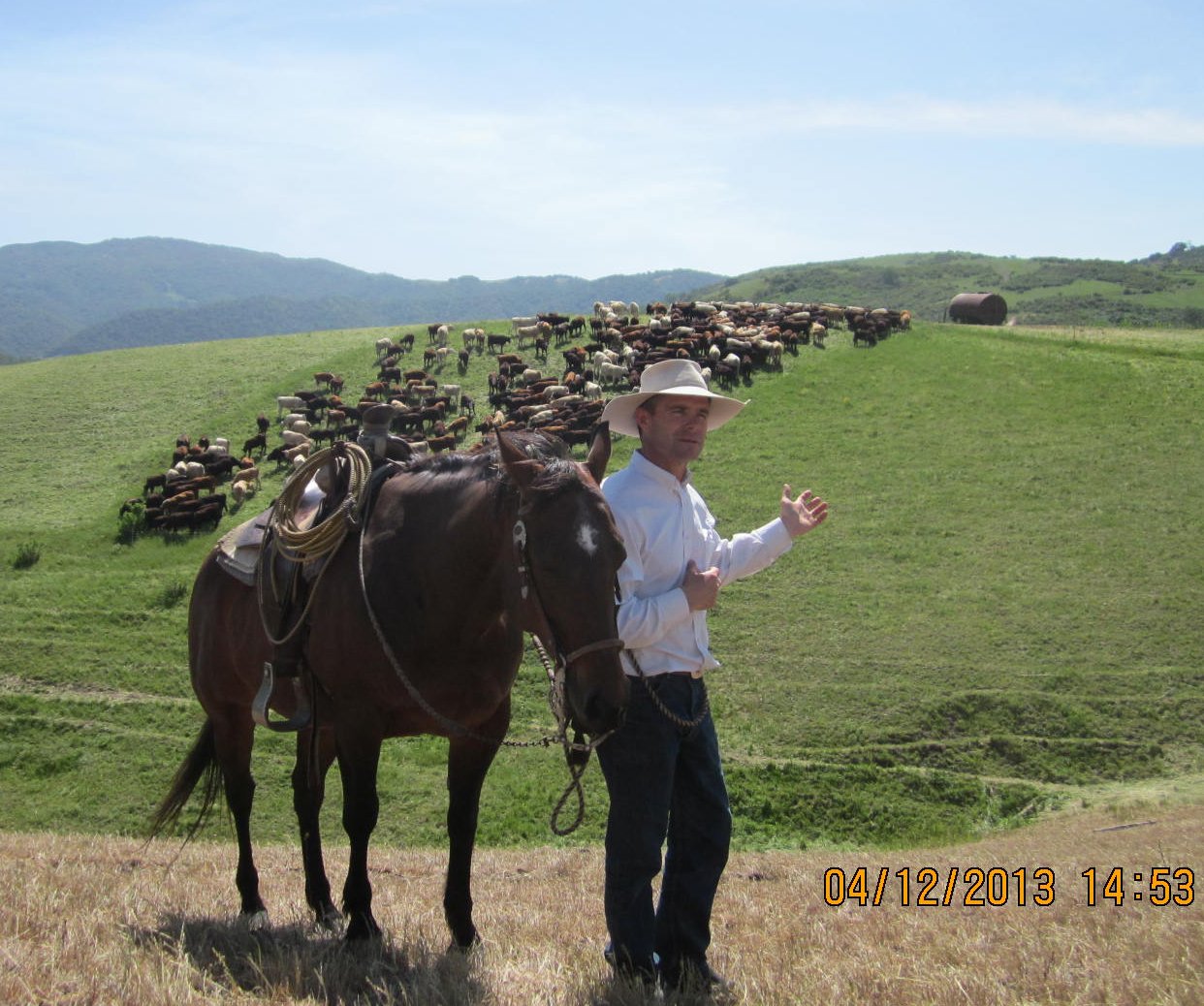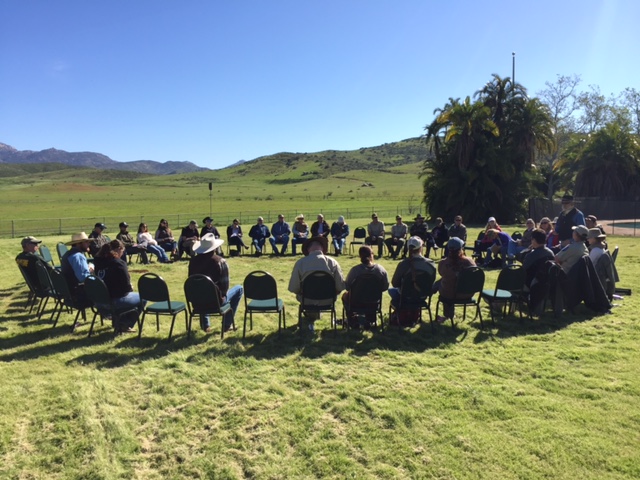
Joe Morris explains the learning site idea where livestock are concentrated for a short period followed by a generous recovery period. In the background, the learning site has about 700,000 pounds of stocker cattle per acre.
To California ranchers, livestock operators, land managers who use livestock, and Resource Conservation Districts:
With a one-day Rancher-to-Rancher session, we connect:
- the core principles of soil health and ecosystem function
- the wisdom and experience of participants
- firsthand observations and experiments using most of our senses and simple equipment
into a fun and social experience of inquiry and shared learning.
This is not a rule-based program, or a PowerPoint lecture. We adapt each session according to the situation, participants, and host(s). We share some skills and questions we use, and we can help you create an environment for participation, observation, and shared learning. We can provide support for continued experimentation and learning with followup events. Our events often include:
- Introduction circle, where everyone has a chance to answer some open questions, know who's there, make connections, and begin to learn how to facilitate a participatory gathering.
- Learning discussion of grazing management with hosts/managers. Challenges and opportunities, addressing various issues with grazing planning: plant recovery, vigor, reproduction, invasive species, soil health principles, infrastructure such as fencing and water.
- Soil health demos such as bread vs flour, slake test, infiltration---all of which can be done and shared by participants. Rainfall simulator demo. Soil health principles, ecosystem processes, the forms of sunlight energy--not just abstract information, but specific, hands-on, grounded in real experience. The contributions that grasslands can make to effective carbon and water cycling, and to regional sustainability.
- Looking at land and soil with eyes and shovel. Rhizosphere, litter, participatory observations (in small groups if participation is > 30).
- Monitoring activities suitable for non-experts such as infiltration, surface transects, visual soil assessments.
- Partners and local resources for people wanting to learn, needing more technical assistance, or access to programs.
- Demos of livestock concentration or "inclusion zone:" before and after observations of short-term high-density trampling as well as low-stress stockmanship.
- Shared learning questions that allow people to reflect on their own learning, different perspectives, and witness the learning of others.
See past events posted on https://soilhealth.app/R2R-California/posts
See also the similar Land Listeners workshop.
One common and popular format: the Rancher-to-Rancher network can help you set up a small, no-risk learning site trial on your land, say a couple of acres or less, where you could concentrate livestock for a few hours or a day, and give it a substantial recovery period from grazing. This could be a public event, or not. Our support could be help in planning the trial to work with your needs, some monitoring of the soil surface and water infiltration.
We have been funded mainly by the 11th Hour project and the Regenerative Agriculture Foundation. To participate, contact one of our committee members:
Joe Morris (San Juan Bautista) 831-801-3798 (joe at morrisgrassfed dot com);
Richard King (Petaluma) 707-217-2308 rking1675 at gmail dot com;
Kent Reeves (San Joaquin Valley, Sierra Foothills) kengewa at hotmail dot com;
Peter Donovan (Soil Carbon Coalition, often traveling) 541-263-1888 managingwholes dot com at gmail dot com
Billy Freeman (Sierra Foothill Conservancy) bsfreema at gmail dot com
Lindsay Mattos (Tuolumne Resource Conservation District)
Recent activity: https://soilhealth.app/R2R-California/posts/
Some articles:
ALTA Magazine article on Rancher-to-Rancher network, May 2021
Rancho Jamul field day (March 2017)
R2R field day near Prather, California with Sierra Foothill Conservancy on March 19, 2016.
Short story on field demo at Hollister SVRA, 4/13.
Read more or download our project description and intro here.
With rancher-to-rancher monitoring forms and cheat sheet here.
Graeme Hand explains some experiments in Australia:
Initial planning meeting: collective statement here.

Gathering at Rancho Jamul, San Diego County, March 2017
R2R gatherings typically include some of the following:
R2R Team
The Soil Carbon Coalition with its California Rancher-to-Rancher team helps land managers, citizens, and communities combine social, economic, and technical assets toward what they need and want on working landscapes, and toward a shared intelligence on the immense power and potential of the circle of life. In California we have worked with over a dozen Resource Conservation Districts, many ranchers, and organizations such as Point Blue and land trusts.
All of us have had considerable exposure to Allan Savory's holistic management framework, as well as to various flavors of regenerative agriculture and grazing management. Team member Richard King has also taught several multi-day grazing planning workshops. We are not consultants or advocates for branded systems or branded ``best management practices,'' but we are advocates and practitioners of self-education and participatory learning based on observation and evidence, as well as understanding basic ecosystem functions. We make a careful effort to encourage curiosity, acknowledging uncertainty in the face of the enormous complexity of managing grasslands, and paying attention to observation and evidence as an aid to learning.
Peter Donovan has herded livestock, worked on farms, and has founded several nonprofit organizations around community development and monitoring ecological function, including the Soil Carbon Coalition. He has studied with Allan Savory (holistic management), Bob Chadwick (consensus facilitation), and Bud Williams (stockmanship). He has monitored soil carbon and soil carbon change on hundreds of locations in North America, and dozens in California. He is interested in combining appropriate technical and social design elements to combine theory and practice, knowing and doing, and in setting up effective feedback loops so that people can take responsibility for what matters to them. He lives in La Grande, Oregon.
Kent Reeves is a Certified Professional Rangeland Manager and Certified Wildlife Biologist with a 40 year public/private conservation career evaluating threatened and endangered species. He has monitored wildlife populations, habitat, soil carbon, and rangelands relative to livestock management throughout California and the west. Kent facilitates and teaches wildlife, range and livestock management courses, workshops, field days and webinars for universities, professional organizations, agriculture producer groups, and NGOs. He has international experience in Kenya and South Africa, and has worked as a cowboy and mule/horse packer in California and New Mexico. Kent can assist with trial site size and location, treatment of trial site, monitoring soil and vegetation, and facilitating rancher gatherings. He has facilitated six R2R events, three field days, and established monitoring on eight ranches and two land trusts since 2013. He lives in Madera, California.
Richard King has ranched on his great grandparents farm in Petaluma, California for the past 29 years and raises grass-finished beef. He retired from USDA-NRCS in 2013 after serving landowners for 36 years as a rangeland specialist and biologist in Arizona and California. He has certifications with the Society for Range Management, California State Board of Forestry and Fire Protection, Holistic Management International, and the Savory Institute. Richard has extensive experience helping others learn how to develop their own grazing, financial, land infrastructure, monitoring and business plans using Allan Savory's holistic framework for decision-making and planning. He also uses Robert Chadwick's consensus building to help individuals or groups resolve difficult issues. Richard can assist with trial site size and location, treatment of trial site, monitoring soil and vegetation, and facilitating rancher gatherings.
Billy Freeman has served as the Rangeland Manager for Sierra Foothill Conservancy since 2011, working in Fresno, Madera, Mariposa and Eastern Merced counties, overseeing the grazing and rangeland management on about 6,500 acres of fee title properties and assisting in the management of over 22,000 acres of Conservation Easement properties. He has a Master's in Natural Resources Stewardship-Rangeland Ecosystem Science from Colorado State, is a California Certified Rangeland Manager (CRM), and is a Certified Professional in Rangeland Management (CPRM) with the Society for Range Management. He has facilitated several Rancher-to-Rancher events and field days and participated in monitoring.
Joe Morris has ranched in San Benito and Santa Cruz counties since the 1990s and sells grassfed beef. He has been a California pioneer of planned adaptive grazing and was the instigator behind the Rancher-to-Rancher network in 2013. He is a board member of the Soil Carbon Coalition and an experienced facilitator.
Funding for the R2R project has been supplied by the Regenerative Agriculture Foundation and the No Regrets Initiative.